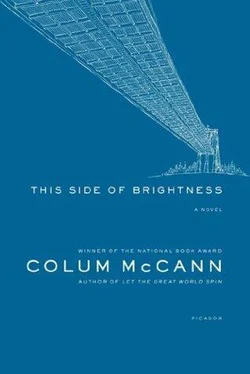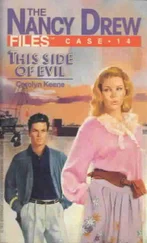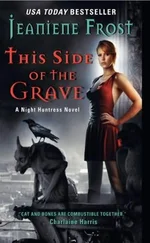McAuliffe pulls his arm in from the window, and in the quick movement of winding up the handle his whiskey bottle tumbles to the floor. He curses loud into the steering wheel and bends down to grab the bottle. He jerks the wheel and turns the car across three lanes of traffic, away from the boys. A checkered taxicab behind him blares its horn. Hoofer McAuliffe rights himself in the seat, all concentration. A man on a bicycle — salmoning his way against the traffic — swerves to avoid the Buick.
McAuliffe slams the brake for an instant, but the boys across the street have directed the hydrant water toward him, a giant fountain making an arc in the air, and he pumps down on the accelerator once more.
The traffic light is red and the accelerator goes deeper to the floor and the engine whines.
He doesn’t see the woman on the crosswalk carrying the large laundry bags in her arms. She is looking over her shoulder and chuckling at the boys anointing the street with water. A roar hits her ears— “Watccchit laidyyyy!” —and she whips around, too late. The Buick crumples the woman at the hip and she is in the air, flying, half somersaulting, clothespins tumbling out of her dress pocket, her thin frame smashing against the windshield, making a spiderweb of glass, her body rolling up onto the roof, denting the metal, her green dress billowing, the street silent but for the patter of water and the screech of tires. Her bag of laundry — cloth diapers and baby clothes — gets pinned to the front of the car. She is flung to the rear, her outstretched arm slapping against the beautiful tail fin.
She flies beyond, slamming her head on the pavement with such a thump that it is the only sound the passersby will later remember, the full dullness of her head against concrete and then the sight of a clothespin soaking up blood, other pins strewn around the street.
The Buick smashes into a mailbox — pinning the bag of laundry against it — and careens out, comes to a halt, sashayed across two lanes.
Hoofer McAuliffe is out of his car, ripping at the buttons on his shirt so that it falls open and the patterned playing cards roam to his hips. He runs back and forth between the car and the woman, beating at his head with his fists. Across the street somebody uses a wrench to turn the hydrant off. McAuliffe’s moans grow louder and he sinks down at the front of his car, on his knees, fingering the massive dents in the hood of his Buick.
It is fifteen minutes before Clarence comes running home, shouting, “Momma’s been hit by a car!”
Walker lunges from his seat and his leg hits against the record player and another scratch etches its way across the vinyl and the needle keeps skipping, skipping, skipping as father and son run for the door. Clarence helps shoulder his father down the stairs.
At the street corner Hoofer McAuliffe is rubbing his fingers over the dent in his car and he shouts at Walker, “It weren’t me! The light was green! She jumped out in front of me! See!” And he points at the imprint of her body in the hood and, beneath his breath, says, “Bitch jumped out in front of me.”
The crowd grows silent as Walker kneels on the ground and takes Eleanor’s head in his hands. The way Eleanor’s hair would touch him in moments of pleasure, like when they hunkered together over a letter and she would sweep her head sideways, the unruly red strands touching his face. Or when she drew the curtain across as the children slept and slipped in beside him in the double bed, hair mashed against the pillow. Or on the bicycle before they were married, taking her long tresses and, from the crossbar, swinging them around and giving him a red mustache, joking, “That’s what our kids’ll look like!” There were long strands of her hair left in the sink when she washed it and, as his own started to gradually peel away from his head, she would take the strands and place them on his forehead, all laughter. Brushing Deirdre’s, Maxine’s — but never enough to remove the kinks and curls. She told their daughters to be proud of the curls. The way he broke a jam jar against the wall when she came home with her locks shorn short. Eighteen months later the locks were there, long again. And once, when he mopped the floor, she came home and was so amazed that she bent her body at the waist and walked crabways across the room and let her hair trail over his work, saying that she trusted him every inch of the way. “Look!” She giggled when she got to the opposite side of the room. “Not a bit of dirt in my hair! You’re the best mopper I’ve ever seen in my life!”
Walker takes off his shirt and cushions his wife’s head, then stands and slowly walks over to the Buick. Tears streaming down his face, he smashes his fist down on the hood until it is collandered with ridges and hollows.
Later that evening, Hoofer McAuliffe is on the street, casually pointing out the dents in his vehicle. The clothes and diapers that Eleanor had been washing for her grandson have already been picked up from the ground.
* * *
He removes the metal head from the shovel at the foot of the door and leaves a note upon it.
I might be gone for a while, Pa. Please look after Louisa and the baby for me. I’ll be in the place you told me about when you were young. Don’t tell nobody. I’ll be back when the clouds clear.
Tucking the shaft of wood into the inside of his overcoat, Clarence picks up his cardboard suitcase, goes down the stairs two at a time, melds into the 4 A.M. darkness, rain slanting yellow in the streetlights of Harlem.
* * *
The feel of the wood in his hands and the way it crushes the skull, like opening up a cantaloupe with a single blow. McAuliffe slumps down against the fender of his smashed-up Buick. Clarence pounds again with the handle of the shovel. Some blood jets out and hits the corner of his eyepatch. He says to the corpse, “We forget we have blood till it comes from us, motherfucker.”
As he rounds a corner, running at full speed, a whistle is blown and he is knocked backward with a police nightstick. But the adrenaline is huge and unstoppable in him, and he rises from the ground with the shovel handle swinging. There is a mighty strength in his aim at the white cop’s jaw.
Hoofer McAuliffe and the white cop, in their sudden silence, are left with the unbelieving looks of men searching for the beat of their own gone hearts.
* * *
Clarence rocks between the cars of a southbound train. Adrenaline still shoots through his twenty-three-year-old heart. A cooling wind brings him relief, the heat unbearable in the rear of the train. He props his sinewy arms between the carriages and goes with the sway. Looking down at the bloodstains on his shoes, Clarence spits on each, smears the blood on the back of his dungarees.
It is morning and the world is heating up already as the train whips out of a tunnel and merges into the gray and green of New Jersey: two boys fighting on a heap of coal, ravaged cars on cinder blocks at the edge of pasturelands, warehouses, a church steeple reaching up in the distance.
The conductor takes his ticket. “Georgia?” he asks.
Clarence doesn’t reply.
“Change in Washington.”
Clarence stares at the railway man’s badge.
“Hey,” says the conductor, staring into Clarence’s face. “The words ‘Yes sir’ mean anything to you?”
No reply.
“Hey, uppity nigger, I’m talking to you.”
After a silence, he leans into Clarence’s face. “You goddamn sumbitches, all of y’all. You listening to me? You’re a goddamn uppity sumbitch. Understand?”
And in his weariness the young man says, “Yessir.”
When the conductor leaves, Clarence leans against the carriage, puts his cheek to the cool of the metal. He could fall right now, land on the tracks and lie there, snakelike, and wait for the segmentation of his body, let the wheels chop him into the tiniest of pieces, let his head travel a mile from his feet, slice his heart into two pumping pieces, scatter his toes to the different winds.
Читать дальше












